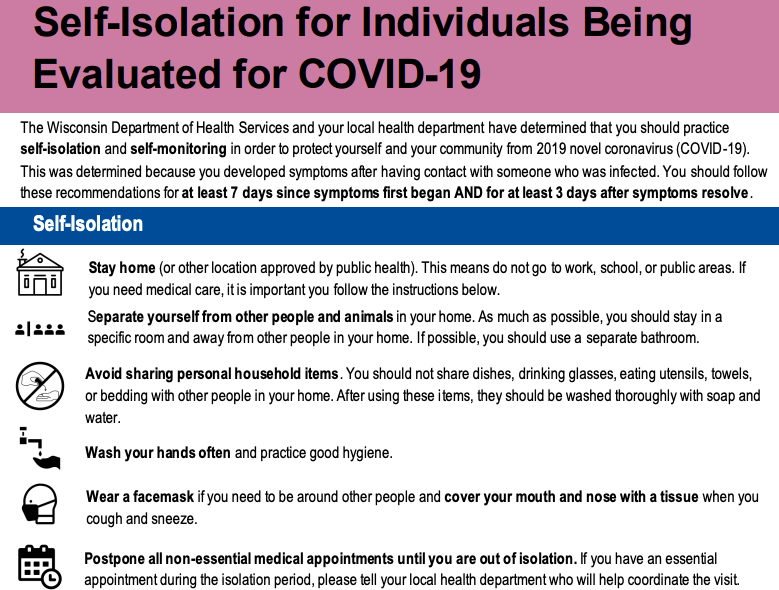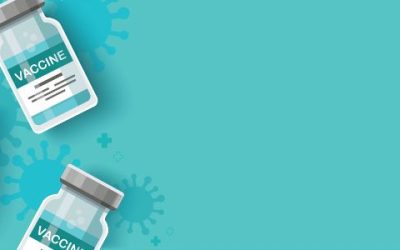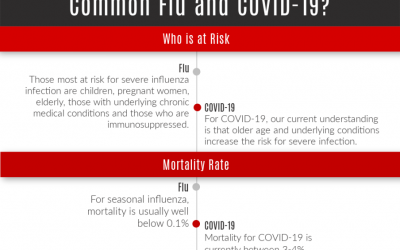
Do you have guidance on self-isolation and quarantine regarding the Coronavirus? YES WE DO.
Questions like this have come up from MERI employees. We’re guessing you have them too. Everyone is looking for reliable information so that they can stop the spread of Covid-19.
Because MERI is an essential business, we will continue to operate during the outbreak. However, this does not mean that we are not taking all necessary precautions to keep our employees safe. They have all received safety instructions while working. In addition, all have specific steps that they need to follow should either they, or a member of their family, become infected.
The primer below explains the difference between self-isolation and quarantine. These guidelines from the State of WI also explain what each is.
Steps of Self-Isolation
What does self-isolation mean? It means that you are currently being evaluated for Covid-19 because you are experiencing symptoms. Likely, it’s because you’ve come into contact with someone who did have the virus.
Here are the steps you need to take for self-isolation.
- Stay home. This means do not go to work, school, or public areas.
- While at home separate yourself from other people in your home.
- As much as possible, you should stay in one specific room and away from other people in your home. Also, you should use a separate bathroom, if available.
Keep in mind the following about Covid-19
- COVID-19 is spread by droplets (being within about 6 feet of someone who is coughing or sneezing).
- COVID-19 can also be spread if someone touches items contaminated with the virus and then touches their eyes, nose or mouth. Examples of items that may be contaminated in the home include used tissues or surfaces that have been sneezed on or the ill person has touched.
- Avoid sharing personal household items. You should not share dishes, drinking glasses, cups, eating utensils, towels, or bedding with other people in your home. After using these items, they should be washed thoroughly with soap and water. Wash your hands often and practice good hygiene.
- Cover your mouth and nose with a tissue when you cough and sneeze then discard into a lined waste container.
- Postpone all non-essential medical appointments until you are out of isolation. If you have an essential appointment during the isolation period, please tell your health provider so they can help coordinate the visit.
When Is It Safe to Come Out of Self-Isolation?
You are safe to come out of self-isolation when:
- You are free of fever, productive cough and other acute symptoms of respiratory infection for 72 hours AND
- 7 days have elapsed from the day you first experienced symptoms.
What does Quarantine Mean?
Quarantine is used for people who have been in contact with someone with COVID-19, but who are not currently sick. The measures listed below are taken because they might become ill. Persons exposed usually begin to show within 2 to 14 days.
For the 14 days after your last contact with the person who has COVID-19 should do the following:
- Stay home. This means do not go to school, work, public areas, or attend large gatherings, such as parties, weddings, meetings, and sporting events. If they need medical care, call their health care provider. Call ahead before going to the doctor’s office or to an emergency room. Tell them symptoms and that they have been in contact with a COVID19 positive family member/friend.
- Do not use public transportation, ride-sharing, or taxis.
- Do not go out to restaurants or have guests over to your house.
- Postpone any travel.
- Wash hands often and practice good hygiene.
- As long as the quarantined person feels well, they may leave the home (in a private vehicle) for a limited time to take care of routine and necessary activities, such as grocery shopping or visiting the pharmacy. Try to avoid busy times of the day.
- Postpone all nonessential medical appointments (for example, dental cleaning, eye exam, routine check-up) until they are out of quarantine. If they have an essential appointment during the quarantine, please call the provider ahead of time.
- Consider minimizing contact with people and animals in your home (stay in your own room and, if possible, use your own bathroom). Avoid sharing personal household items such as dishes, towels, and bedding.
- They can be released from the quarantine 14 days after the last time they were in close contact or shared an indoor living environment with you. Day 1 of the quarantine for someone living with you will be the day after you are free of fever, productive cough and other acute symptoms of respiratory infection. This does not apply to a family member who works in healthcare, they are to reach out to their employer to give them directions.
- If your family member or close contact develops any new onset respiratory symptoms (fever, cough, sore throat) they need to reach out to their healthcare provider immediately.
Let Us Know If You Have a Covid-19 Medical Waste Question
We hope these guidelines about self-isolation and quarantine are helpful.
Please let us know if you have any other questions we can address in a future blog.
Call us at 608-257-7652 or email us at info@meriinc.com.



